Tag: Self-Discipline
Wisdom for Teams #14


—
“The unexamined life is not worth living.”
—
SOCRATES (c. 470 – 399 BC), Greek philosopher credited as one of the founders of Western philosophy.
An Exercise to Prepare for Confinement
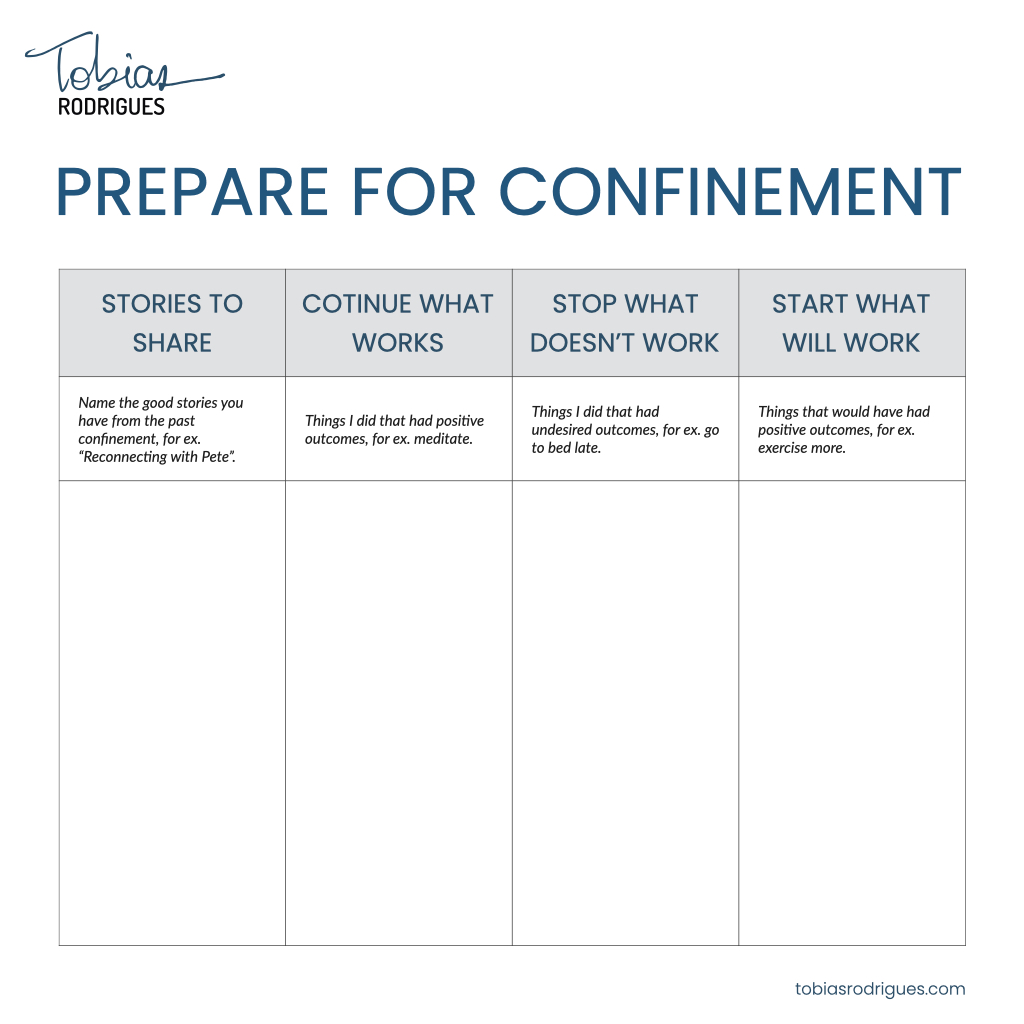
Winter is coming (for some of us) and with it the likelihood of another confinement (in one form or another). It would be dumb not to prepare. This is what I’m doing.
Three Steps
Step 1: Take some time alone to fill in the template below. Ask family and friends to do the same, especially those who will be spending more time with you.
Step 2: Come together in a celebrative spirit to share your findings.
Step 3: Decide what you will commit to. Focus on what requires low effort but has a high impact for you and those around you.
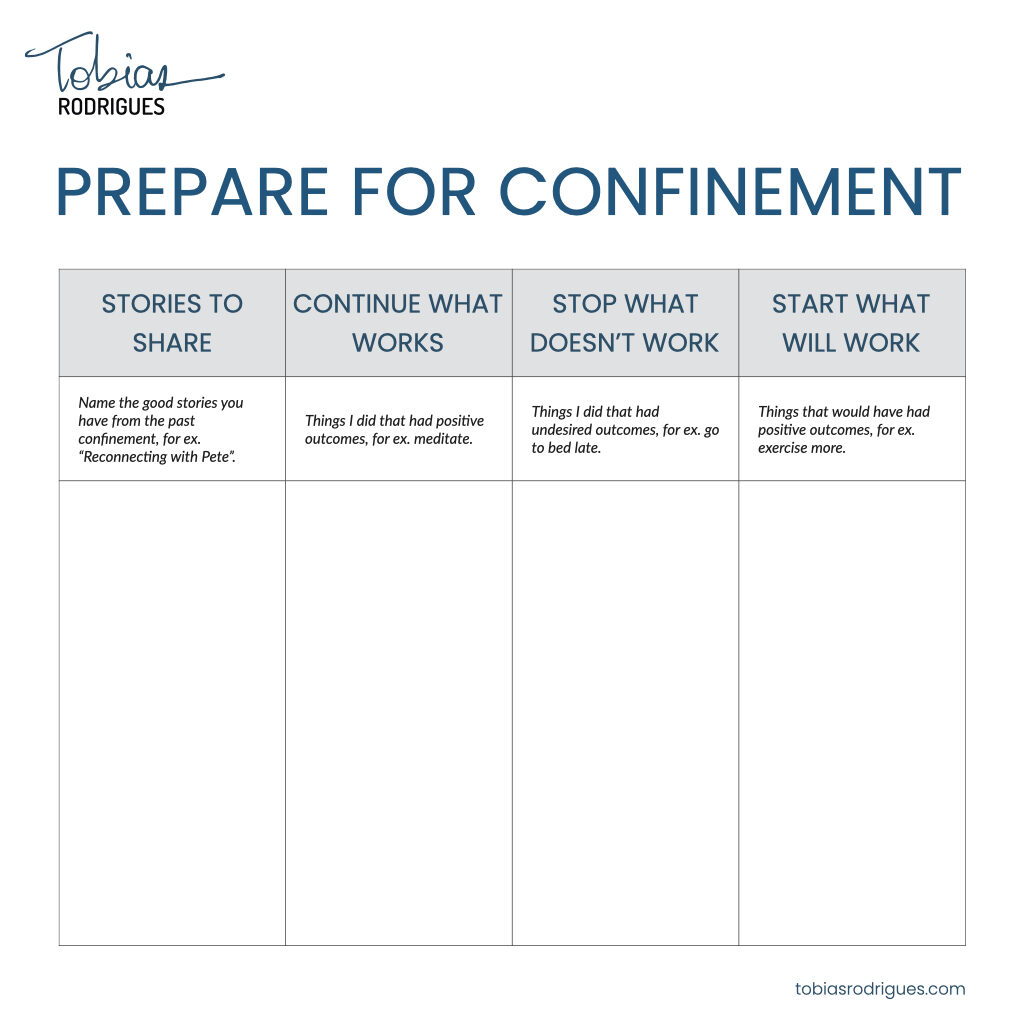
—
Would love to know what works best for you. Please share your results.
The Question That Helped Me Face Uncertainty
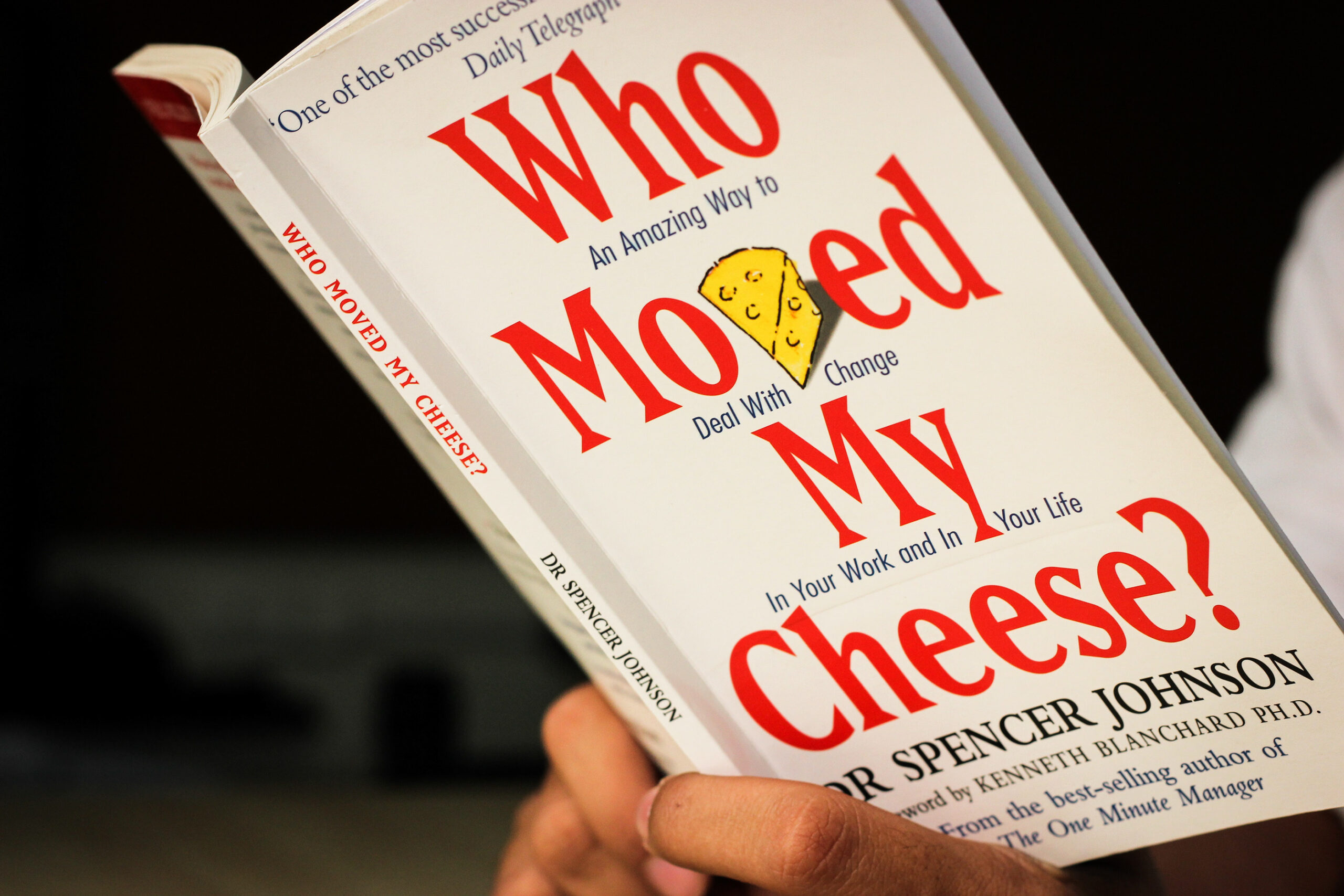

—
Most of my work is done face-to-face. Or at least it used to be. When the pandemic broke out I soon realised that a profound and irreversible change in the events and training industry was going to take place. The urge to freak out was big:
- How long will the confinement last?
- How long until face-to-face events will be allowed?
- How will I transfer my trainings online?
- What equipment do I need?
- How does this sh*t work???!!!
And then it happened. Early on in the lockdown, a friend of mine, Onu Igbokwe, referenced a book: Who Moved My Cheese, by Spencer Johnson. I had read the book years back but decided to listen to the audiobook. Life changing. It’s a must read. If you’ve already read it, and you’re facing uncertainty, then read again.
It’s a short book. A couple of hours is enough. But don’t be fooled by its length. The author says it took about 20 years to write it. Every word counts. What most changed my approach and behaviour was one simple question:
—
What would I do if I were not afraid?
—
The voice in your head might be saying: “But I am not afraid”. So here are other reactions to the uncertainty that comes with change:
- worry, concern, unease
- doubt, self-doubt, confusion, hesitation
- agitation, stress, anxiety, nervousness
- denial, refusal, complaining, intolerance, aversion
Fear has a funny way of disguising itself. If you’re feeling any of these, chances are there’s a degree of fear involved — the fear of failure. So here’s another way of putting the question:
—
What would you do if you could not fail?
—
After listening to the book things got better. I did a full-blown online training with Amazon, and was invited to impart shorter trainings and talks, as well as online coaching sessions. And next week I’ll be facilitating a two-day online “home-site” with King, the creators of Candy Crush.
Luck? Yes. Absolutely. So much luck. I also like to think Seneca is at least somewhat right when he says luck is what happens when preparation meets opportunity.
But even if the book or my behaviour had nothing to do with my work picking up, my experience nonetheless of these uncertain times has consequently been more tranquil. So thank you, Spencer, and thank you, Onu!
Grandpa Jose’s Effectiveness Recipe

My grandfather was born in the Azores Islands in 1906. His schooling literally lasted two days: the first and the day after. He got punished, didn’t like it, left and never went back.
Grandpa didn’t learn to read or write. Grandpa didn’t really know who Aristotle, Shakespeare or Karl Marx were. Grandpa didn’t rely on business trainings or performance enhancement models. Grandpa was a farmer.
One day, when he was but a young man, his dad gave him and his brother a gift: a pregnant young cow for the two to start their lives as herdsmen. Two years later, his brother owned two head of cattle; grandpa Jose, seven. From then on, his success kept multiplying, considerably.
This afforded him the opportunity to savor life, especially his passion for discovering the wonders of the world. In the end, grandpa grew to be quite the philosopher, readily armed with the precious pearls of common sense and practical wisdom.
The recipe of his effectiveness? He used say he remembered that often at the end of the day while he sat by the sunset reflecting, he’d notice his brother in the distance, still tilling the earth, persistently putting his back into every strike.
“Before the sun rose,” he used to say, “John would already be out on the field. And not before dark would he return! — All hard work and diligence. I did it differently. Every morning I’d ask myself: ‘What do I have planned for the day?’” Then he’d think:
How can I accomplish twice as much with half the effort?
Grandpa kept at it until he found an answer. Most of them eventually worked.
I gather an important lesson from my grandfather: To make it an undying habit to stop, rethink and improve. I’m sure he would be happy to know that Aristotle thought along similar lines: “We are what we repeatedly do. Excellence, therefore, is not an act but a habit.”
I must confess, though, I sometimes recognize a bit of great-uncle John in me. What about you: with whom do you most identify with?
Decide The Ending To This Story
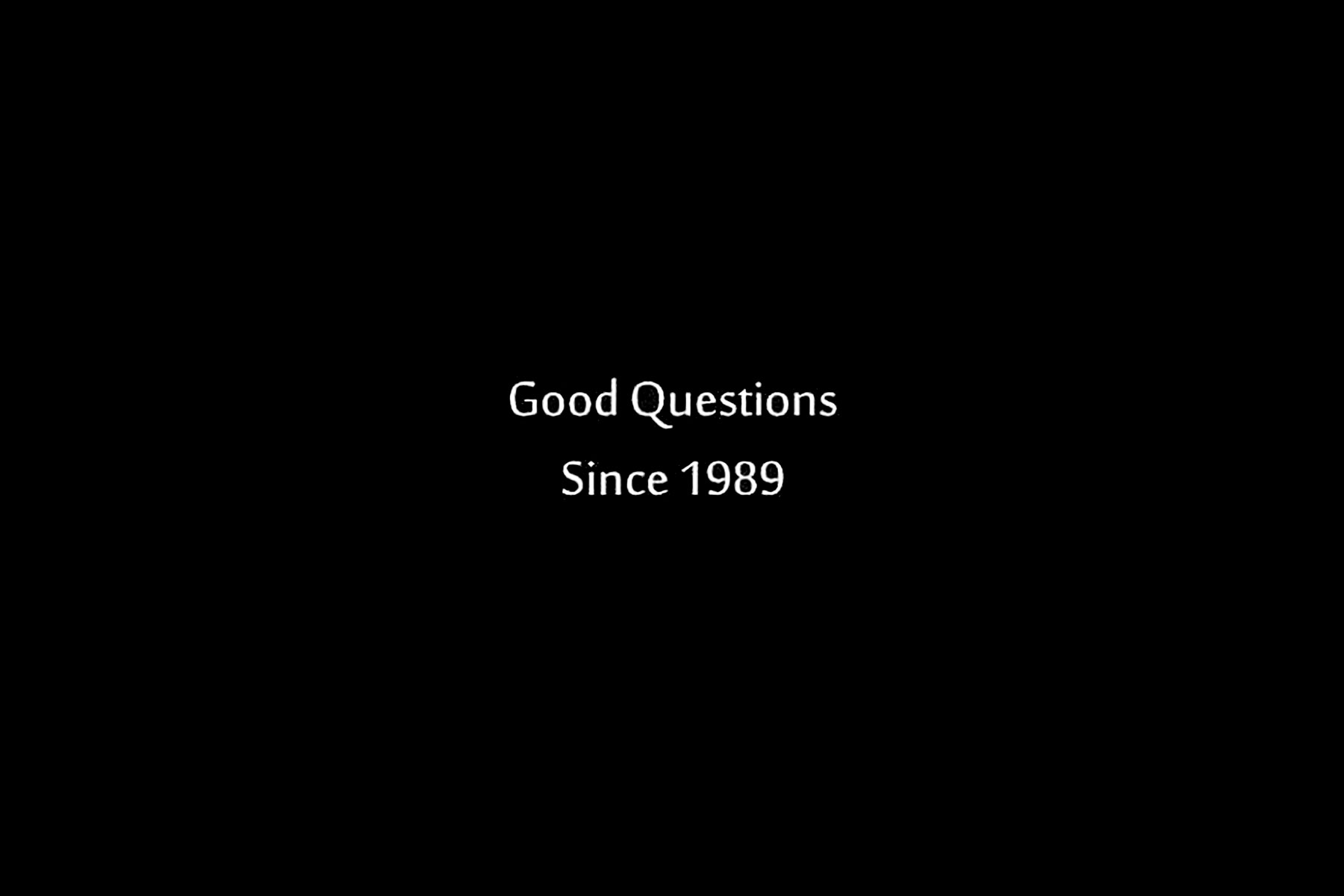
It was a Saturday. John had recently moved into his new apartment and was in the process of unpacking the wall of boxes standing tall in his living room.
After a couple of weeks adjusting to the new environment, he decided that this weekend he’d finally unpack.
In a box labeled “fragile” and among a bundle of gym clothes, John found a painting his younger sister had made for him before he moved. It depicted a tall, self-confident man in a suit, smiling at the viewer, and plugged by an electrical cable to what seemed to be a small red machine with wheels and a sign that read: “Good Questions Since 1989.”
As he stared into the man’s eyes, he wondered what his sister meant. He liked the painting and decided to put it up on the center living room wall. He managed to find the old rusty coffee can where he kept nails and screws and stuff. But after seven other boxes and lots of things all over the place, he gave up the quest for his toolbox.
Suddenly, the art restoration shop across the street came to mind. He had noticed it more than once: different, fresh, full of light and color. “Hey!” he thought “Maybe they could lend me a hammer.” He skipped over to the window and looked down to check if it was open. It was.
“Good” he thought. “The owner, that tall, self-confident young man that wears a suit, seems to be a nice guy. He might even remember me — I’ve seen him more than once at the café next door. Yah, I’ll ask him to lend it for just a minute. Why wouldn’t he lend me a hammer? Just because I’m a stranger?”
John stumbled around the apartment looking for his keys, which he eventually found on the couch under all his sports gear. As he went for the door, he thought: “Come on, John, you wouldn’t lend a hammer to stranger, right?” And it crossed his mind that a shop like that must have expensive and fancy equipment. The owner needs to protect it.
With growing doubt, he stepped into the elevator and pressed zero. As he looked at himself in the mirror, he said: “Is there a reason for him not to trust me?… Well, folks don’t trust each other like they used to, do they? And besides, I’ve just moved in. For all he knows, I’m a thief!”
Ding! The elevator door opened and John stepped out. He exited the building, looked across the street to the shop and asked himself: “Give me one good reason why he shouldn’t help me?” Then he thought: “Well, for starters he could be a selfish jerk who doesn’t give a damn about anybody!”
He resentfully crossed the street and walked into the shop. “Good morning!” He bluntly blurted to the young man in a suit sitting behind the counter. The man stood up and with a smile replied: “Good morning, Sir. How can I help you?”
With a cold face, John looked him in the eye and, with a touch of bitterness in his voice, said: “You don’t know me and there’s no reason for you to trust me. For all you know, I’m a thief. I actually live across the street and can’t find my hammer. So for just this once could you not be so overprotective and lend me one of those expensive hammers?!”
To the amazement of all those in the shop, the tall, self-confident young man disappeared into the back, dragging behind him his red portable oxygen tank on wheels. He returned bearing a hammer in his hand. In silence, he extended the gift to the stranger.
After thanking him and promising to be right back, John turned and left the shop. As he was crossing the doorway, the young man said: (now pick the ending you like most)
Ending 1: “By the way Sir, this is why I love my work. You see, since 1989 we’re in the business of restoring not only paintings but, more importantly, perceptions!”
Ending 2: “By the way Sir, since 1989 we repair problems with better questions. Try it. You see, the mind has no choice but to always find an answer — even to bad questions!”
Ending 3: One of your own.
Do Your Requests Inspire Trust?

Have you noticed how some people tend to always get what they ask for at work: a raise, time off, more time, change in plans, etc.? And what’s more, everyone seems delighted to attend to their requests. What’s their secret?
You might remember when you were little, grownups requesting the magic “P” word when you asked for something: “What do you say?” And then we’d say: “Can I… PLEASE?” Demands and requests were clearly differentiated by the “P” word.
Intended or not, the effects of this practice reach beyond good manners. It taps into how our brains are wired: When a person hears your petition as a request, she feels the power to contribute to your wellbeing. If she willingly does so, she will feel satisfaction.
People who don’t care how their requests are received instill distrust and have a hard time getting what they want.
When a request is heard as a demand, it feels like an imposition. This leads either to rejection or submission, both harboring feelings of resentment, anger or other nasty things that can pop up in the future to bite us.
In a grownups’ world, where roles aren’t always clearly defined, requests and demands can look a lot alike. A simple “please” might no longer do the trick:
“Hey Jeff, I want that budget by the end of the day please.” “Kate, please send me the report now, got it?” Are these requests or demands? What counts is how the person hears your request. It’s what makes the difference to get what you want.
You get what you want when you voice your needs in a way that others hear them as requests, not demands.
Three things you can do to assure your requests are heard as such: Prepare to hear “no”. Ask the person to tell you what she just heard you say. And promise yourself not to engage in persuasion until you’ve understood the person’s explanation.
This has an incredible effect: it shows you care about that person’s needs, not just your request. She will feel this. This generates trust, a new opening to express your request.
It’s funny: you get what you request by being prepared not to get it! Another option is not care, but that brings us to square one: demands. And we know how that ends, right?
It’s Always My Fault!
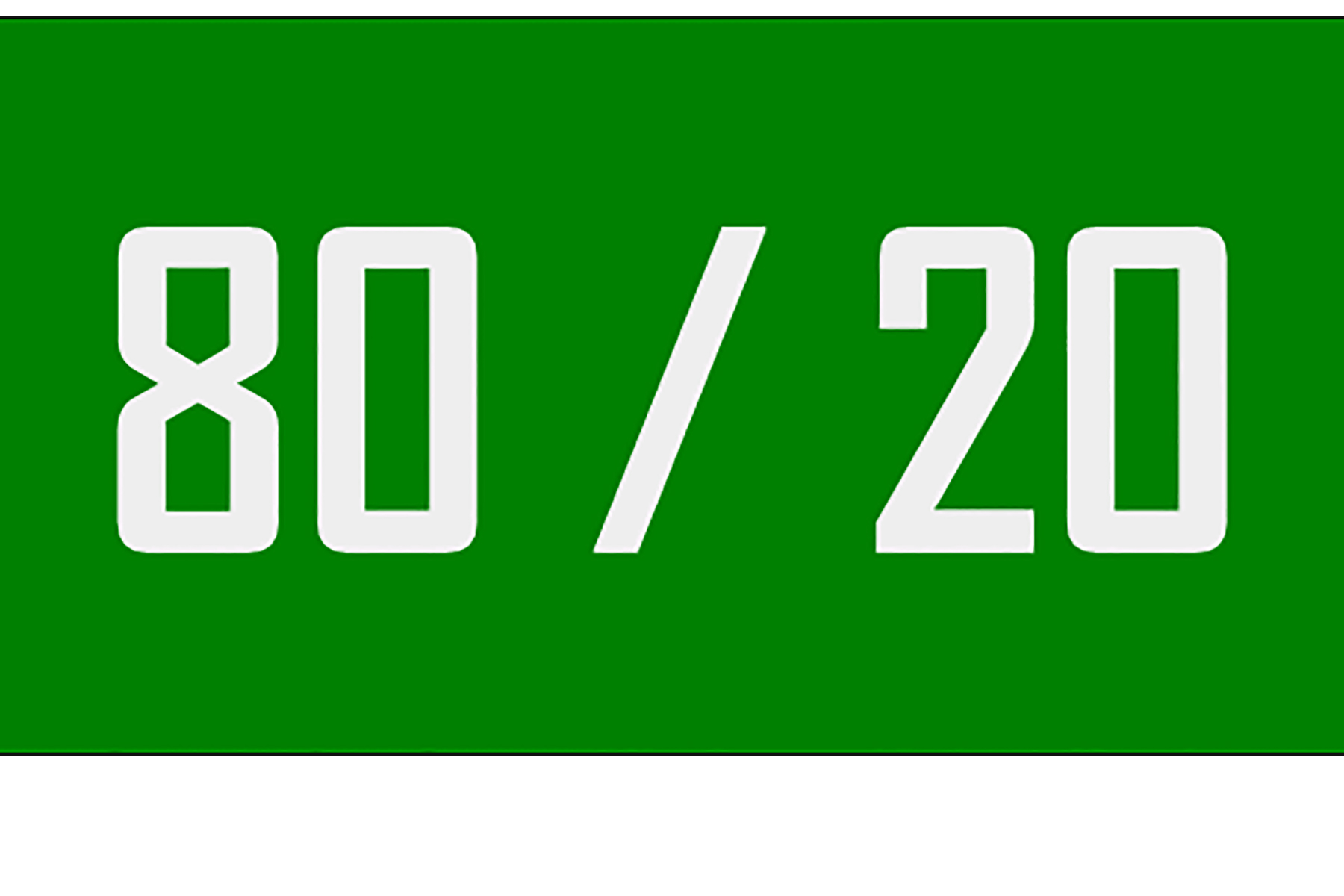
 On Tuesday, a client and I met to discuss a session we’re going to do on relationship management. One of the topics was how the corporation’s managers sometimes can’t stand some of the people they work with. They feel it’s useless and case closed.
On Tuesday, a client and I met to discuss a session we’re going to do on relationship management. One of the topics was how the corporation’s managers sometimes can’t stand some of the people they work with. They feel it’s useless and case closed.
I love this topic, especially when it comes up in my seminars. It’s always interesting to see the look on participants’ faces when I present the commitment ratio of the relationship building system I created: 80% you; 20% the other person. What?!
Yep, that’s the look on their faces. You do 80% of the work and the other person does 20%. “That’s not fair!” — some might say. Relationship management at work is not about fairness (that comes later), it’s about effectiveness.
The ultimate challenge is not
how you relate to others. It’s how you deal with YOU!
Relationships need to function for everyone to get their jobs done. An 80/20 ratio assures your commitment produces functioning results that guarantee performance. “But it doesn’t make sense: the other person is the problem, not me!” — others object.
This reminds me of a story back in my university days. One late night, as I was making my way home, I saw a man literally banging his head against a street post. I kind of recognized him, so I walked up to him.
After a long monologue, I came to learn his tragic story. His wife had left with another man and took the children. His partner was no longer a partner. His business was crumbling. He was drinking… I almost felt sorry for him. But then I didn’t.
It’s a tough lesson: either you take on the responsibility
of being in charge of the events of your life or… you don’t.
When he finally asked if I wasn’t going to say anything, I asked: “You expected people would behave in a certain way, right?” What?! — was the look on his face. Then silence. Then a smile.
“That’s right”, he said. “I’ve blamed everyone around me for everything that has happened to me. That puts the power to lead my life in their hands, not in mine. To be in charge, I need to accept it’s my fault.”
That day, that man began to understand that it will always be up to him to take charge of how relationships affect his life and how he will proceed. He understood that the outcomes of our relationships start with us.
Today, that man leads a fulfilling life — lots of challenges no doubt, but fulfilling. Today, he is an 80/20 man, committed to producing functioning results that guarantee performance. His approach is: regardless of what happens, it’s always my responsibility.
Could this work for you? I’m eager to see how the managers will respond!

